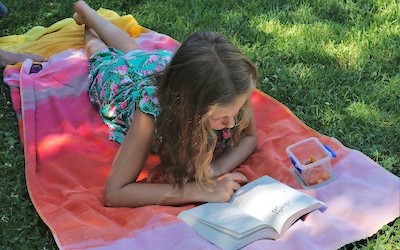27 Tips to Boost Kids’ Reading This Summer
By Kasey Short

However, as much I hope all children will read over the summer, I know it is ultimately up to them and their families.
Communicating with families, motivating students, providing choices, increasing access to books, and encouraging participation in public library summer reading programs all help encourage students to read during our longest break of the year.
Family Communication
Communicating with families about your school’s expectations for summer reading before the end of the school year allows them time to ask questions and seek help from us as needed. It also gives teachers and librarians multiple opportunities to build excitement around great summer reads.
I suggest sending the information to all parents from the school and then an additional email from the child’s ELA teacher that includes grade level specific details and suggestions. I like to remind parents that audiobooks, graphic novels, and high-interest magazines are all excellent texts to read over the summer. I also share that my hope for students is that they choose texts that interest them and find enjoyment in reading for pleasure.
It is helpful to send any documents needed to support summer reading to families both digitally and in print. This allows them to access the documents any time over the summer from a device while we also make sure there’s a printed version for those who don’t have access to a printer at home.
This information should include a clear statement of why your school expects reading will take place, resources that will help students be successful, and suggestions to include the entire family in summer reading. Tips for parents and guardians might include:
● Choosing a book for a family book club with everyone committing to reading and talking about the book over the summer.
● Setting aside time to all sit down and read together.
● Offering to read out loud to your child. Children are never too old to be read to.
● Choosing audiobooks to listen to in the car together.
● Going to the library and/ or the bookstore as a family.
Motivation
Partner with the school librarian to design structures that motivate students to read during the summer.
● For the final month of school announce and hype school wide incentive programs with small prizes for everyone and larger raffle prizes so that students can earn raffle tickets based on their reading. Then when students return in the fall give out prizes in a public forum.
● Create fun ways for students to track their reading such as reading bingo cards that they fill in throughout the summer, blocks to color in or mark off as they read, or digital forms to click as they read books and track their progress in real time.
Photo by Skylar Zilka on Unsplash
● Have students brainstorm and create book lists of what they would like to read over the summer. Encouarge them to set goals for themselves.
● Encourage students to send in photos of themselves reading books they enjoy and then post the photos to the school social media account.
● Have adults in the building share their own summer reading goals with students.
● Encourage participation in public library summer reading programs.
● Encourage students to create book clubs with their friends and find a few books they would like to read and discuss together in person or online over the summer.
● Ask teachers across content areas to talk up summer reading so that students see that reading is valued in every subject. This also gives them additional examples of adults in their lives who are excited about books.
Choice

Photo by Gaelle Marcel on Unsplash
Providing students an opportunity to make choices about what they want to read is perhaps the best way to motivate them. Students will value the ability to select their own summer reading books but many need guidance in choosing books they’ll enjoy.
● Provide students with various book lists such as award winners, books by topic, popular books in the school library, recently published books, books in a series, fiction and nonfiction, etc.
● Give students time in school to create a list of books they would like to read over the summer before they leave for break Design activities to help them build their list. Encourage them to list any book that might interest them; they can make final choices as the weeks go by.
● Facilitate activities with students to help them build their book list.
● Read the first chapter or a few pages of various books out loud to students the last month of school and have students add the ones they like to their personal list.
● Make time for students to do quick book talks with classmates where they highlight books they have enjoyed throughout the year.
● Survey students and create a digital list of books they have loved this year that students can access during the summer.
● Do a “book tasting” where stacks of books are placed around the room and students move around and look at the different books with their friends.
● Remind students that audiobooks, graphic novels, and magazines are all great texts for summer reading.
● To promote nonfiction ideas, ask teachers of all content areas to recommend books about their specific subjects to their students.
Access
Making sure students and their families are aware of different ways to access books helps gets books in the hands of kids throughout the summer.
● Provide information about how to get a library card so they can access digital and print books from the public library.
● Provide information and access to all school digital book platforms and remind students how to use the applications and their passwords.
● Have students brainstorm ideas together for where they might get books over the summer. One idea might be to swap books with friends, neighbors, and family members. Another might be to look for bargains at thrift shops and used book stores.
● If possible, send home books with students to read over the summer and return the following fall.
● Locate neighborhood free library boxes around the school and neighborhoods where students live and send home those locations. Encourage students to visit these free library boxes to get books and drop off books they no longer want. Some students may want to start little free libraries of their own.
Use Public Libraries
Encourage families to sign up for public library summer reading programs and to visit their public library regularly over the summer.
Send home information about the public libraries near your school that includes locations, hours, summer reading programs, directions for obtaining a library card, which libraries are near public transportation, and links to library online catalogs.
In addition to providing unlimited access to print and digital books and a quiet space to read, public libraries offer summer reading incentive programs and have professionals working all summer to help children find books they will enjoy and be motivated to read. Signing up for public programs will provide incentives and resources for students in addition to the ones given by their school.
For a preview of the national Collaborative Summer Library Program’s latest activities for all ages, click here.
Feature image by KWhitt at Pixabay.
Kasey Short (@shortisweet3) loves to share ideas from her classroom and writes frequently for MiddleWeb. She attended the University of North Carolina at Chapel Hill and earned a bachelor of arts in middle school education with a concentration in English and history. She went on to earn a master’s in curriculum and instruction from Winthrop University. She is currently an eighth grade ELA teacher and English Department chair at Charlotte (NC) Country Day School.



































